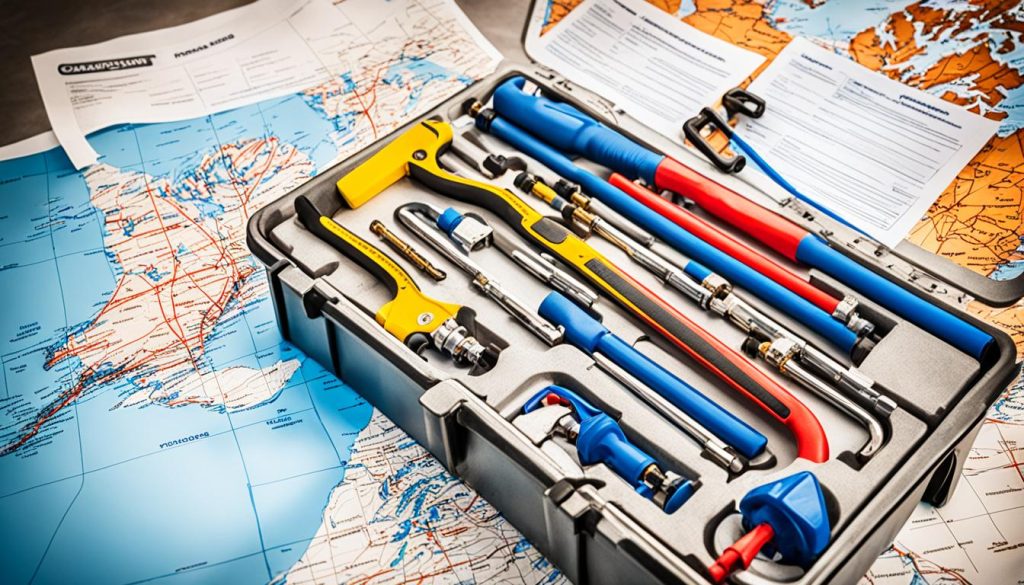Navigating Your Path to a Plumbing License in Canada
Did you know that becoming a licensed plumber in Canada can open up a world of opportunities and provide job security? With the demand for skilled plumbers on the rise, obtaining a plumbing license can lead to a rewarding and lucrative career. In this article, I will guide you through the process of obtaining your plumbing license, from the requirements and certification exams to the application process in different provinces across Canada.
Key Takeaways:
- Obtaining a plumbing license in Canada can lead to job security and higher income potential.
- The requirements and certification exams vary by province, so it’s important to research the specific regulations in your area.
- Completing an apprenticeship program and passing the certification exam are key steps in the licensing process.
- Once licensed, plumbers must renew their licenses periodically and stay updated with industry advancements through continuing education.
- A plumbing license provides professional recognition and credibility in the industry.
Understanding Plumbing Programs in Ontario
In Ontario, there are various plumbing programs offered by colleges to help individuals pursue a career in plumbing. These programs provide valuable knowledge and hands-on training to prepare students for a plumbing apprenticeship and eventual licensure. Whether you’re just starting out or already an apprentice, there is a program suited for your needs.
The plumbing programs in Ontario can be broadly categorized into two options:
1. Preparatory Overview of the Plumbing Field
This option is designed for aspiring plumbers who have little to no prior experience in the field. It provides a comprehensive introduction to plumbing theory, principles, and practice. Students will learn about plumbing systems, fixtures, materials, tools, and safety procedures. This foundational knowledge equips them with the necessary skills to succeed in a plumbing apprenticeship.
2. Theory and Hands-on Training for Registered Apprentices
For those who are already registered apprentices, this option combines theoretical classroom instruction with practical hands-on training. It further enhances their plumbing knowledge and skills while they continue to gain real-world experience under the guidance of experienced professionals. This training ensures that apprentices are well-rounded and competent in all aspects of plumbing.
Regardless of the program you choose, completion of a plumbing apprenticeship is a mandatory requirement to obtain a plumbing license in Ontario. These programs provide you with the essential knowledge, skills, and confidence to excel in the plumbing industry.
Benefits of Plumbing Programs in Ontario:
- Comprehensive understanding of plumbing theory and practice
- Familiarity with plumbing tools and equipment
- Hands-on training to develop practical skills
- Opportunity to network with industry professionals
- Preparation for a successful plumbing apprenticeship
By enrolling in a plumbing program, you are setting yourself up for a rewarding career as a licensed plumber in Ontario. Take the first step towards your plumbing journey and explore the available programs today!
Requirements for Plumbing Apprenticeship in British Columbia
To work as a plumber in British Columbia, you need to have completed secondary school, including courses in mathematics, physics, and science and technology. These foundational subjects provide the necessary knowledge and skills for a successful career in plumbing.
Many employers in British Columbia prefer applicants who have completed a four-year apprenticeship program. This apprenticeship program combines classroom instruction with hands-on training, allowing aspiring plumbers to gain practical experience in the field. It is through this program that individuals develop the necessary skills and knowledge to excel in the plumbing industry.
Completing an apprenticeship program is not the only requirement to become a licensed plumber in British Columbia. You are also required to gain certification through BC’s Industry Training Authority (ITA). This certification demonstrates that you have met the industry standards and possess the necessary competencies to work as a plumber.
In order to obtain a Certificate of Qualification as a plumber, you must write the Interprovincial Exam. This exam is designed to test your knowledge and skills in plumbing and qualifies you for the Interprovincial Standards’ Red Seal. The Red Seal is a nationally recognized certification that allows you to work as a plumber anywhere in Canada.
By fulfilling these requirements, you can embark on a rewarding career as a licensed plumber in British Columbia, confident in your skills and expertise.
Requirements for Plumbing Apprenticeship in British Columbia
| Requirement | Description |
|---|---|
| Secondary school education | Completion of secondary school, including courses in mathematics, physics, and science and technology |
| Apprenticeship program | Completion of a four-year apprenticeship program, combining classroom instruction and hands-on training |
| Industry Training Authority (ITA) certification | Gain certification through BC’s Industry Training Authority to meet industry standards |
| Interprovincial Exam | Write the Interprovincial Exam to obtain a Certificate of Qualification and qualify for the Interprovincial Standards’ Red Seal |
Apprenticeship and Certification Requirements in Canada
Apprenticeship programs for plumbers in Canada offer a comprehensive blend of classroom studies and on-the-job training. These programs are designed to provide aspiring plumbers with the necessary knowledge and practical skills to excel in their careers. Depending on the province, the apprenticeship program typically consists of four 12-month periods, each comprising a specific number of on-the-job training hours and technical training blocks.
During the apprenticeship, you will learn the fundamentals of plumbing through classroom studies, where you will gain a solid understanding of plumbing systems, codes, regulations, and safety procedures. This classroom education is supplemented by hands-on training in real-world settings, where you will work alongside experienced journeypersons to apply your knowledge in practical scenarios. This combination of classroom studies and on-the-job training ensures that you receive a well-rounded education that prepares you for the challenges of the plumbing industry.
After completing your apprenticeship, you will be required to pass a certification exam to become a licensed plumber. The exam assesses your understanding of plumbing theories, codes, and practices, as well as your ability to solve plumbing-related problems. Successfully passing this exam demonstrates your competence as a plumber and enhances your professional credibility.
In Canada, achieving a Red Seal certification is highly regarded and allows you to work as a plumber anywhere in the country. The Red Seal is a national standard that recognizes the skills and qualifications of tradespeople across various provinces. By obtaining a Red Seal, you can demonstrate your expertise and open up even more opportunities for career growth and advancement.
| Key Points | Benefits |
|---|---|
| Apprenticeship combines classroom studies and on-the-job training | Gain comprehensive knowledge and practical skills |
| Four 12-month periods with specific training requirements | Receive a well-rounded education |
| Passing the certification exam is required | Enhance professional credibility |
| Red Seal certification offers national recognition | Expand career opportunities |
I have personally found that the apprenticeship journey is a rewarding experience that allows you to develop your skills, build relationships with industry professionals, and pave the way for a successful plumbing career. The combination of classroom studies, on-the-job training, and certification helps ensure that you are well-prepared to tackle the diverse challenges of the plumbing profession.
Opportunities and Salaries for Licensed Plumbers in Ontario
As a licensed plumber in Ontario, you have a wide range of career paths to choose from. Whether you prefer working on residential projects, commercial buildings, or industrial sites, there are ample opportunities in the plumbing industry.
One popular option for licensed plumbers is residential plumbing, where you’ll work on homes and apartments to install, repair, and maintain plumbing systems. This can include everything from fixing leaks and unclogging drains to installing new fixtures and water heaters.
On the other hand, if you enjoy larger-scale projects, commercial plumbing might be the right fit for you. In this field, you’ll work on plumbing systems in commercial buildings such as offices, schools, hospitals, and shopping centers. Tasks can range from installing and maintaining pipes and fixtures to handling the plumbing needs of complex systems like HVAC.
If you’re interested in more challenging and specialized plumbing work, industrial plumbing may be the path for you. This sector involves working on plumbing systems in industrial facilities such as factories, power plants, and manufacturing sites. You’ll handle tasks like maintaining and repairing large-scale piping systems, understanding industrial processes, and ensuring compliance with safety regulations.
Many licensed plumbers also choose to become plumbing contractors, offering their services independently or by forming their own plumbing companies. As a contractor, you’ll have the opportunity to work on a variety of projects, manage your own schedule, and build relationships with clients.
As for salaries, entry-level plumbers can expect starting salaries around $25,000 per year. However, as you gain more experience and certification, average salaries rise to approximately $50,000 per year. Keep in mind that these figures can vary depending on factors such as location, specialization, and employer.
It’s also worth noting that union plumbers typically earn higher salaries compared to non-union counterparts. Unionized plumbers can benefit from collective bargaining agreements and enjoy higher wages, better benefits, and additional job security. Salaries for union plumbers in Ontario can reach up to $70,000 per year.
For a visual representation of the salary ranges for licensed plumbers in Ontario, refer to the table below:
| Category | Starting Salary | Average Salary | Union Plumbers Salary |
|---|---|---|---|
| Residential Plumbing | $25,000 | $50,000 | $60,000 – $70,000 |
| Commercial Plumbing | $25,000 | $50,000 | $60,000 – $70,000 |
| Industrial Plumbing | $25,000 | $50,000 | $60,000 – $70,000 |
| Plumbing Contractors | $25,000 | $50,000 | $60,000 – $70,000 |
Remember that these figures are approximate, and salaries may vary based on individual factors and market conditions. However, they provide a general idea of the earning potential for licensed plumbers in Ontario.
Steps to Apply for a Plumbing License in Canada
Applying for a plumbing license in Canada involves a straightforward process that varies slightly depending on the province you are in. Here are the general steps to follow:
Gather Documentation
Start by gathering the necessary documentation for your plumbing license application. This may include:
- Proof of completion of an apprenticeship program
- Passing the certification exam
- Additional experience requirements (if applicable)
Submit Your Application
Once you have compiled all the required documentation, submit your application to the appropriate licensing authority in your province. Be sure to fill out the application form accurately and provide all the necessary information.
Pass the Examination
Depending on the province, you may need to undergo an examination to assess your knowledge and skills in plumbing. Prepare for the examination by reviewing the relevant materials and practicing sample questions.
Renew Your License
After successfully obtaining your plumbing license, remember to renew it periodically according to the requirements set by the licensing authority in your province. This ensures that your license remains valid and up to date.
By following these steps and meeting the necessary requirements, you can navigate the process of applying for a plumbing license in Canada and embark on a rewarding career as a licensed plumber.
Benefits of Obtaining a Plumbing License
Obtaining a plumbing license can significantly enhance your career prospects in the plumbing industry. By becoming a licensed plumber, you can unlock a wide range of job opportunities, ensuring a promising future in this field. Let’s explore some of the key benefits:
1. Job Opportunities
With a plumbing license, you’ll have access to a multitude of job opportunities. From working as a residential plumber to being involved in commercial or industrial projects, the possibilities are extensive. This license opens doors to employment with reputable plumbing companies, construction firms, or even establishes the foundation for your own plumbing business.
2. Job Security
One significant advantage of obtaining a plumbing license is the assurance of job security. Licensed plumbers are in high demand, and the need for their expertise remains steady regardless of economic fluctuations. As a licensed professional, you can enjoy the peace of mind that comes with job stability in a thriving industry.
3. Higher Income Potential
A plumbing license can substantially increase your earning potential. Licensed plumbers often earn higher incomes compared to their unlicensed counterparts. Certified plumbers usually charge higher rates for their services, as their expertise is recognized and valued in the industry. With experience, successful projects, and a reputable license, you can expect a significant boost in your income.
4. Professional Recognition
Being a licensed plumber offers professional recognition and credibility. Clients, employers, and colleagues acknowledge the hard work and dedication required to obtain and maintain a plumbing license. This recognition enhances your professional reputation and builds trust among potential clients and colleagues.
Overall, obtaining a plumbing license opens up a world of opportunities, job security, higher income potential, and professional recognition. It is a valuable investment in your plumbing career that ensures a prosperous and fulfilling future.
Continuing Education for Licensed Plumbers
As a licensed plumber in Canada, I understand the importance of staying current with new technologies in our field. The plumbing industry is constantly evolving, and it is crucial to keep up with the latest advancements. Ongoing learning and continuing education are key to maintaining our professional development.
By staying updated on industry trends, licensed plumbers like myself can provide the best services to our clients. We can offer innovative solutions and utilize new technologies to improve efficiency and effectiveness in our work. Whether it’s learning about eco-friendly plumbing systems or mastering advanced tools, ongoing education enhances our capabilities and enables us to deliver top-notch service.
Continuing education also opens doors to new career opportunities. As the industry evolves, there is a growing demand for plumbers who are knowledgeable about the latest technologies and practices. By expanding our skillset through ongoing learning, we can position ourselves for career growth and advancement. Whether it’s specializing in specific areas like smart home plumbing or becoming a plumbing consultant, ongoing education empowers us to adapt to changing market needs.
Professional development should be a lifelong commitment for licensed plumbers. It allows us to stay ahead of the curve, remain competitive, and provide exceptional service to our clients. So, let’s embrace the opportunities for ongoing learning, stay current with new technologies, and continue to evolve as professionals in the dynamic world of plumbing.
Source Links
- https://www.ontariocolleges.ca/en/programs/professions-and-trades/plumbing
- https://www.vpl.ca/siic/guide/employment-guides/plumbers/how-do-i-become-a-plumber
- https://www.careersinconstruction.ca/en/career/plumber
- Investing Wisely: How Windows & Doors in Boost Property Value and Financial Health - April 24, 2025
- The Financial Impact of Personal Injuries: Why Legal Help Matters for Business Owners - April 16, 2025
- The Hidden Financial Costs of Domestic Assault: What Business Owners Need to Know - April 16, 2025













